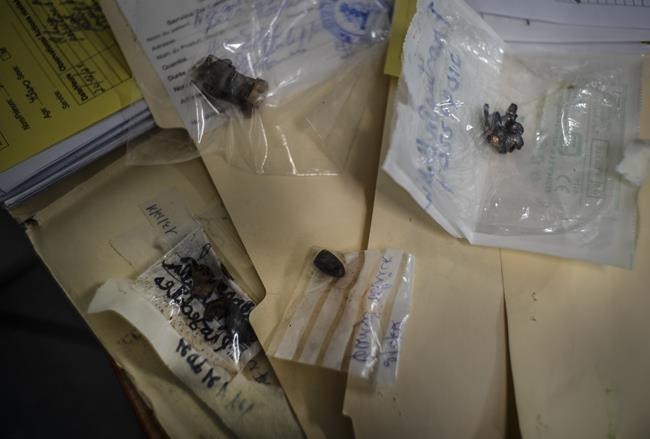OTTAWA — Canada is sanctioning two senior Haitian officials for their alleged support of gangs, which MPs have been told are exploiting children and wreaking havoc akin to a civil war.
"The majority of the victimized population (is) suffering greatly, increasingly deprived of essentials, exposed to increasing violence, and feel abandoned," said Patrick Auguste, head of a diaspora youth association, at a House of Commons subcommittee meeting on Friday.
Haiti is facing an intractable series of crises that have closed hospital and schools during a deadly cholera outbreak and widespread power outages.
It’s all made worse by gangs that are blockading the country’s main fuel terminal, leading the government to call for foreign military intervention, despite not holding an election since 2016.
On Friday, Foreign Affairs Minister Mélanie Joly announced sanctions in lockstep with the U.S. for two senior Haitian officials who allegedly financed gangs in their country.
The new sanctions include Joseph Lambert, the president of the Haitian Senate, and his predecessor, Youri Latortue, whom Ottawa accuses of giving "illicit financial and operational support to armed gangs."
The U.S. Treasury Department was more specific, accusing both of leading cocaine trafficking from Colombia and directing people to engage in violence.
Latortue rejected those claims, saying he had spoken out about violence and gangs, and that the decision lacked due process.
"I fought corruption and laundering with numerous public reports," he tweeted. "I will defend myself with law and truth."
A spokesperson for Lambertdid not immediately respond to messages from The Associated Press on Friday.
At the House subcommittee on international human rights, non-governmental organizations told MPs on Friday that gangs are paying desperate Haitians to act out at protests and cause chaos in the streets.
"Due to what we can only call a civil war, there are currently over 100,000 internally displaced persons in Haiti," said Morgan Wienberg, head of the group Little Footprints Big Steps.
Wienberg said "foreign pedophiles" are sexually abusing children with impunity, since Haiti can't get "illegal orphanages" under control, a problem that's existed since she moved to the country a decade ago and ramped up in recent months.
She encouraged Canada to work with civil-society groups to stem problems that are leading to gangs recruiting children.
"The Haitian government cannot be the voice that foreign governments are listening to, because it's very clear the Haitian government is not acting on the interests of the Haitian people," Wienberg said.
Others testified that Haiti has faced a power vacuum since the Duvalier dictatorship ended in 1971, leading to zero-sum politics with no consensus on how to govern the country.
Chalmers LaRose, a political-science lecturer with the Université du Québec à Montréal and Royal Military College of Canada, said part of the chaos stems from the whims of foreign countries.
LaRose noted that Haiti was economically punished by France for declaring its independence in 1805, followed by an American invasion in 1915.
"It was a state that was completely banished from the rest of the world, for at least a century," he said in French.
He was skeptical of recent comments by U.S. officials that Canada could be a key player in a military intervention.
"Canada must also find its own voice in this crisis and not simply seek to be the lapdog of the U.S.," LaRose said.
Other witnesses suggested using drones to fire on gangs, or coming up with an aid package modelled on the Marshall Plan, which helped rebuild postwar Europe.
The Associated Press reported that there was gunfire around Haiti's main fuel terminal in Port-au-Prince, with the Haitian National Police saying it made progress in an ongoing fight against the powerful G9 gang that has been blocking site access for weeks.
Canada and the U.S. have sent armoured military vehicles for that police force.
Prime Minister Justin Trudeau has said that Canada must help Haiti in some capacity, even if it doesn't mean a military intervention.
"We look at the crisis, rapes, the violence, the poverty, and the cholera and health crisis. And then we say to ourselves, we have to intervene in one way or another," he told reporters in French on Wednesday.
That evening, he was briefed by his former national security adviser, Daniel Jean, who led a four-day assessment mission last week.
An official readout did not indicate how Trudeau will proceed, but said a cabinet committee "explored a range of options … to support a Haitian-led solution."
Auguste proposed Canada make a public apology on behalf of all Western nations for their centuries of meddling in Haiti, to help end finger-pointing between the government, gangs and foreign countries.
"What's happening now is everybody passes the buck," he said.
This report by The Canadian Press was first published Nov. 4, 2022.
—With files from The Associated Press
Dylan Robertson, The Canadian Press
Note to readers: This is a corrected story. A previous version quoted Patrick Auguste as saying the majority of Haitians are suffering greatly.




